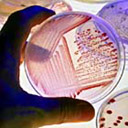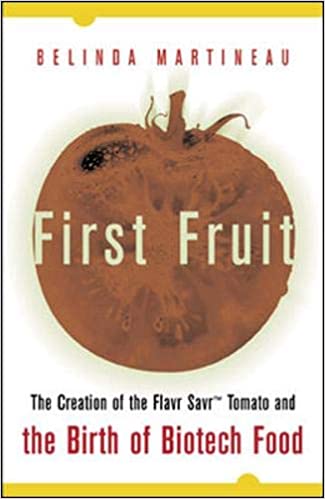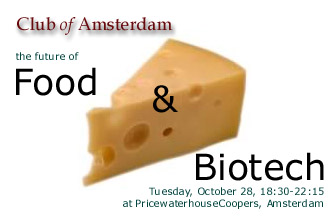
Content
Q&A with Jeanine van de Wiel
Jeanine van de Wiel Head of Unit, Safety Assessment of Novel Foods, Health Council of the Netherlands
Club of Amsterdam:Can the government guarantee food safety?
Jeanine van de Wiel: There is extended legislation and enforcement, education and communication effected by the government to realize food safety. Not only at the national level but also at EU level and worldwide in the Codex Alimentarius standards for food safety are set. Apart from that new risks can emerge and it can take time to develop an adequat policy to counterbalance these new risks. The actual production and sales of food stuffs are in the hands of many different enterprises and food processing is done by catering business and consumers themselfs. So there is a certain vulnerability of the system. As in all human society systems.
How will consumers benefit from novel foods?
Jeanine van de Wiel: In the same way as they benefit from old foods. Plus possibly environmental stress resistant crops in areas that have now bad agriculture opportunities, less herbicide residues, custom made nutritional profiles, taste improvements (due to novel processes) etc etc.
Can Europe or The Netherlands play an independent role in a global market?
Jeanine van de Wiel: There is always room for a nation or Europe as a whole to use their own arguments to yes or no allow certain products or production methods within their boundaries. The precautionary principle is recognized world wide. But it has to be used proportional to the – perceived – risk.
Join our Club of Amsterdam Event about
the future of Food & Biotech on October 28, 18:30-22:15!
About the future of Food & Biotech

20 Questions on Genetically Modified (GM) Foods
by the World Health Organization
These questions and answers have been prepared by WHO in response to questions and concerns by a number of WHO Member State Governments with regard to the nature and safety of genetically modified food.

by the Dutch by Ministry of Agriculture, Nature and Food Quality
This policy document on Food Production and Rural Areas (Voedsel en Groen) focuses on the change in thinking about the agricultural sector. It is not concerned solely with primary agriculture, but with the whole chain from primary sector to consumer. This agrifood complex is characterised by socially responsible business practice, a high level of knowledge and innovative strength and is thus a world market leader. A demand-centred approach is essential since the agrifood complex is driven by the wishes of citizens and consumers.
News about the Future
Nanotechnology for Energy Prosperity
by Richard E. Smalley, Ph.D., Nobel Laureate, University Professor, Rice University
Energy is likely to be the single most critical factor affecting worldwide prosperity in this next century. Within the next few decades as production of oil and gas peaks and then begins to decline (even though world population-driven demand for energy continues to increase) we are going to have to find vast amounts of energy from one or more sources, capable of at least 10 terawatts (TW) of low cost, clean, sustainable power. Assuming that we don’t do this with 10,000 nuclear breeder reactors, this 10TW challenge simply cannot be met with our current science base. To get that 10 TW we will need revolutionary advances in the core technologies that underlie solar power; wind turbines; deep drilling to mine the heat of the earth; carbon sequestration; hydrogen production, transport and storage; fuel cells; batteries; flywheels; electric power transmission systems; robotics; and super strong, light weight materials for every moving thing from cars to rockets to satellites. Nanotechnology will be at the core of all these revolutions.
GLOBAL ECONOMY
KNOWLEDGE SOCIETY
World Development Report 2003: Sustainable Development in a Dynamic WorldThe next 50 years could see a fourfold increase in the size of the global economy and significant reductions in poverty but only if governments act now to avert a growing risk of severe damage to the environment and profound social unrest. Without better policies and institutions, social and environmental strains may derail development progress, leading to higher poverty levels and a decline in the quality of life for everybody.
Misguided policies and weak governance in past decades have contributed to environmental disasters, income inequality, and social upheaval in some countries, often resulting in deep deprivation, riots, or refugees fleeing famine or civil wars.
Today, many poor people depend on fragile natural resources to survive. Similarly, trust between individuals, which can be eroded or destroyed by civic unrest, is a social asset with important economic benefits, since it enables people to make agreements and undertake transactions that would otherwise not be possible. Development polices need to be more sharply focused on protecting these natural and social assets.
These are among the key findings of the World Development Report 2003. The report suggests new alliances are needed at the local, national and global levels to better address these problems. The report is now available on-line in a new form that includes a dynamic table-of-contents, improved search capability, and extensive links to supporting documents.
MEDIA & ENTERTAINMENT
Video on e-paper?
How would you like to sit back in your favorite garden chair and browse through a holiday brochure with video clips that give you an enticing preview of your possible destinations? Or have the pleasure of curling up with a good book that’s actually a movie? Although such possibilities won’t come about tomorrow, Philips’ video-speed, electronic paper is an exciting concept that’s certain to fire the imagination of consumers and manufacturers alike.
It is based on a technology called electrowetting, Philips’ new display concept. It’s a ‘reflective’ technology, which means just like paper it reflects ambient light. Unlike other types of display, if you’re in a well-lit space or outside, you can still see the display easily – from any angle and with the same high contrast. And it doesn’t need backlighting, in contrast to the LCDs currently used in mobile devices.
“We’re still at the very early stages of development,” says Rob Hayes, one of the senior scientists at Philips Research involved in the project, “but we’ve had a fantastically positive reaction to the small demo screens we’ve created. And there are so many possibilities. Even in the age of screen-based media, people still like the physical pleasure and convenience of books and magazines, and with the continuing development of flexible electronics, we foresee this technology being used to put video displays on thin, flexible support media similar to paper.”
Tuesday, October 28, 2003
Biotech Start-Up
BioPartner Start-Up Ventures
BioPartner Start-Up Ventures is a venture fund for life sciences start-ups. They invest up to a maximum of € 227,000 in life sciences start-up companies. An important condition for their investments is matching funds of private investors. Investments are provided in exchange for shares in the start-up company, or as a combination of shares and and a convertible loan. The fund of € 10.5 million is managed by Zernike Group B.V.
http://www.biopartner.nl
Recommended Book

First Fruit: The Creation of the Flavr Savr Tomato and the Birth of Biotech Foods
by Belinda Martineau
Engaging both sides of the agricultural biotech controversy and hoping to initiate a reasoned dialogue, geneticist Belinda Martineau explores the development and eventual failure of the Flavr Savr tomato in First Fruit. One of the Calgene scientists who worked on the tomato (the first genetically modified food on the market), she offers great insight into the scientific and business factors that drive the research and marketing of biotech products. Concerned about the eager and simplistic denial of most of her colleagues when faced with protests from consumer advocates, she wants to see more direct communication between the two sides.
Using the story of Flavr Savr’s development, Martineau shows the reader both the quality of biotech research and the power of management to obfuscate or otherwise affect that work. Though straying into dead-end stories of her colleagues’ interactions a little too often, for the most part the narrative flows smoothly and draws the reader along swiftly to the tomato’s eventual, inevitable demise in the market. Ironically, the Flavr Savr failed more because it couldn’t live up to Calgene’s nearly messianic marketing than from any protester’s work, even if it did launch a few activists’ careers. Telling industry to pay more heed to honesty and research while suggesting that the public pursue better scientific education shouldn’t be asking too much – perhaps First Fruit will help de-escalate the debate. – Rob Lightner
PricewaterhouseCoopers is a supporter of the Club of Amsterdam.


The Club of Amsterdam Roundtable: Karel van der Poel

Karel van der Poel
Co-founder, CEO, Mirror42
Member of the Club of Amsterdam Roundtable
When one believes in Darwin’s theories of evolution, one views mankind as a product of evolution. Our ancestors Homo Habilis started to create tools in order to survive. We evolved, created more advanced tools, learned and documented our knowledge. Today, our knowledge has brought us to a turning point in evolution.
Evolution of life on earth has evolved to the point that one of its “creations” (human species) can now influence evolution itself! (I like to call this proces: “New Nature”) With the human species understanding a little bit more about the building blocks of life everyday it will become more able to apply that knowledge and manipulate species, eventually our own!
Evolution has very clear laws of what defines success and failure. A successful genetic change survives and its genes increase in the overall gene pool of the species, while unsuccessful changes die. Like evolution itself, “new nature” will create successful and unsuccessful changes to several species on earth (from crops to eventually humans). The question is if the human race will be willing to accept the laws of evolution in order to judge “new nature” creations. The results would be that stronger species would eventually dominate the gene pool and that “failures” die, how hard and difficult that might be. It would mean that eventually entire species will be altered forever and that new ones are created and todays ones will die out.
Since evolution also has taught us that innovation is central in human evolution, we know that trying to stop these developments is probably impossible. It is in our genes.
Therefore let us develop a vision on how to deal and live with the outcome that “new nature” is going to create.
Club of Amsterdam Events 2003/2004
| October 28, 2003 | the future of Food & Biotech |
| November 27, 2003 | the future of the Media & Entertainment Industry |
| January 28, 2004 | the future of the European Knowledge Society |
| February 18, 2004 | the future of Education & Learning |
| March 31, 2004 | the future of Energy – the Hydrogen Economy? |
| April 28, 2004 | the future of Healthcare & Technology |
| May 19, 2004 | the future of Architecture |
| June 23, 2004 | the future of Culture & Religion |








Customer Reviews
Thanks for submitting your comment!